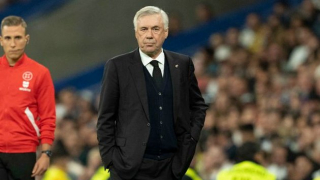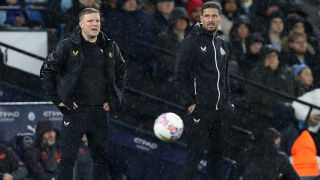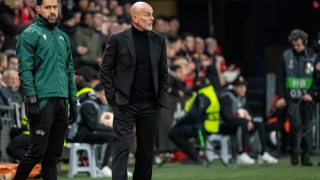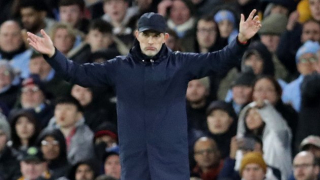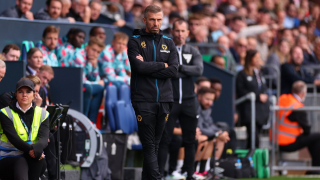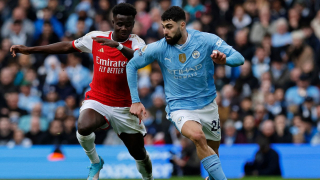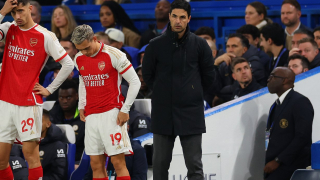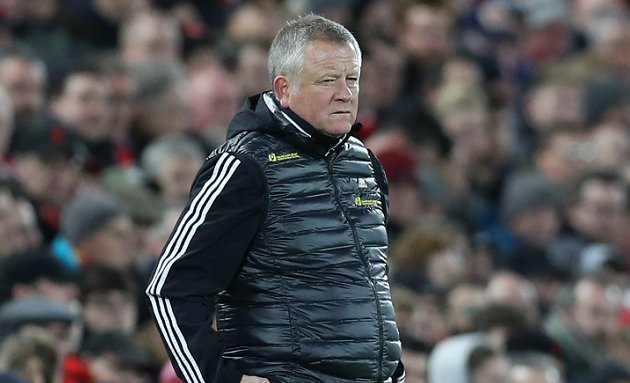Since arriving at the club in 2009, Simon Weaver has transformed the fortunes of Harrogate Town AFC.
The club, which were struggling for money and marooned towards the bottom of the National League North, are now on the brink of a historic promotion to the Football League and this in large part is down to the work of the Weaver family.
Not only is Simon the longstanding coach, but his father Irving Weaver is also the chairman after taking over in 2011.
The club have since secured a promotion to the fifth tier of English football for the first time in their 100-year history, ending a 14-year stint in the sixth tier.
Harrogate are now third in the National League, ahead of the likes of Notts County and Hartlepool, and are looking at a tight promotion battle as the season reaches its climax.
However, Weaver is calm as usual and in a reflective mood when asked about his first ten years with the club.
“It's been hard work," he told Tribal Football.
“I think we are different club and a different entity to where we were in 2009. But I suppose I wouldn't be here if we were still in the same spot. Obviously, the ownership changed after two years and that gave the club a chance to start something and start fresh."
Weaver actually joined the club as a player-manager, having spent much of his career as a journeyman centre-back in the fourth and fifth tier of English football.
Following short spells at Boston United, King's Lynn, Redditch United and Ilkeston Town between 2007 and 2009 lower down the league pyramid, he joined a struggling Harrogate.
“Under the old ownership, the money had run dry," he explained.
“In fact, there wasn't any and when I first took over the first team, there weren't any players in it. We were in the conference north and it was a pretty bad situation, especially with a 31-year-old player-manager, who didn't know what he was in for. It was a very tricky first year, but second year we got better."
Two years into his role his father was approached to take on the role as chairman, a move Weaver initially had doubts about.
“After my second year at the club, the former chairman decided it was his time to quit," he recalled.
“He was 82 years old and he said to me, I'm going to ask your dad. My dad had been in business, was a keen football follower and a big supporter of me, but I was obviously reluctant at first, because of how a father-son dynamic would work as manager and chairman, I'd never heard of it. What happens if we go six or seven games on the bounce without a win? There would be all the usual pressures, but it's made it more difficult because there's the easy angle of us being father and son."
Luckily, Weaver and his father decided it would be a good move for the club and Irving became the chairman before the start of the 2011/12 season.
“We were at a young club still in its infancy, so we kind of considered it a rebirth," Weaver said.
“It wasn't really known as a footballing area at the time, but slowly we launched a pitch and we managed to improve the engagement. We did work with kids and with local community groups, and then there was a fondness towards the football club from the community. It became a sporting hub."
The 2011/12 season proved challenging and Harrogate just avoided relegation, but with the work being put in off the pitch, things started to improve on it.
The following year, the team got to the FA Cup second round for the first time and by 2016 plans were being laid for the club to go full-time.
“The fan base grew quite quickly and when we went full time we started to attract young, aspirational players," Weaver said.
“Those players had our mindset and were prepared to run through hoops to achieve. We grew very quickly once committed to being full time and to that pitch and we quickly became a force in non-league football. In our first year of being full-time we went up to the National League and we then reached the playoffs in our first season in the National League. It's a far cry from where it was and the hand we were dealt in the first year was very, very hard. But I think you learn a lot from mistakes and from things going against you. We have now broken through that ceiling and it's an exciting time to be in Harrogate."
Weaver credits the decision to go full-time with much of the club's success in recent years and said that without the change they couldn't be where they are.
Improving their training facilities was also an important part of this process and it was a move Weaver said allowed them to change how outsiders viewed the club.
“While we were semi-professional it was very hard to build a project," he said.
“We had to travel outside of the area in order to train because the area we're in didn't have a 3G facility. The pitch was terrible and we couldn't actually train on it because it would get too damaged. This all made it very difficult to make any progress at all. Obviously the shift in momentum really came when we got the new pitch and we got a better ground to train on. This was like a blank canvas to build on."
For semi-professional players and coaches, the decision to go full-time can be a daunting one.
Weaver was aware of the change such a move would bring about at the club, but decided to address the issue early so everyone knew where they stood.
“When we decided to go full time, I decided to be as open and transparent as possible," he explained.
“I remember it was the game just after the new year. I said to my staff look, we're going full-time next season. Please let me know if this is something that would interest you. I then spoke to the players. I think that giving it this time, meant that they had time and we had time to make decisions and decide on what we needed to do to step up to being a full time club. It also gave us time to get out there that we were after young, hungry, athletic players with good technical ability. We wanted to play a brand of football that's attacking and a really quick brand of passing football, and we began to realise that we had come across some really good-quality, hungry young players."
Given the position from which the club emerged, remaining financially secure is imperative for its long-term prospects.
Many clubs have moved up and down the leagues rapidly because of such an approach, but this cycle of boom and bust is something Weaver and his father want to avoid.
“Going full-time and gaining promotion was always a dual ambition with breaking even and being financially solid," he said.
“This is a difficult thing to do in football because halfway through the season, you could get an injury and you have to leave some money aside in the budget so that you can accommodate for that. But we also improved the coaching setup, invested in our youth set up and we now have a partnership with the community. We have kids training on the pitch that went up from one night a week, to two nights a week and that's now four nights a week. Two players that came through this system were on the bench for the first team recently."
Despite their promotion to and subsequent success in the National League, the squad turnover has been pretty small in recent years, and while Weaver understands how cutthroat recruitment in football can be, he still hopes to see some of the homegrown players he helped develop taking the next step up.
“We recruited to go up and many of the players we have now were National League North players," he said.
“A lot of people told us that we should be looking to refresh the squad more, but we built this project on togetherness. If you just scrap it all together, then people start to wonder what it's all about. There are examples higher up of Leicester City and Sheffield United who did a similar thing and have had huge success."
Perhaps the only so called big name in the squad is former Blackburn Rovers, Sunderland and Sheffield United forward Jon Stead.
Far from a flashy character, Weaver was full of praise for the work ethic and attitude he brings.
“We signed Jon Stead after he had gone down to the National League with Notts County," he said.
“We knew that he was a Yorkshire lad and even though he's 36, we knew that he could offer something to these young lads in our squad. We don't want flashy names and because I think that really makes the club lose a sense of what it was. I'd love to see our players that have been with us since the National League North playing for us in the Football League. Of course not every player will make it but if the majority do then I think we've created a great legacy for the club."
Someone in football that Weaver particularly looks up to is Sheffield United manager Chris Wilder, despite the Harrogate manager starting his career at United's city rivals Sheffield Wednesday.
With Wilder having a background in non-league football, Weaver has played against one of his sides and said he is a great guy on and off the pitch.
“A couple of years ago Chris came to a charity game and I actually played on the same team as him," Weaver recalled.
“He was having a laugh in the changing room just like everyone else we had a chat after the game and we got along really well. Later on I saw him out in Portugal when he was with some of the Sheffield United team. We chatted and he knew all about how we were doing that season. I also remember playing Halifax with Scarborough when he was the manager. Even then he had the same principles about team spirit and energy and desire. He's always been very honest, and he just tells the truth and you can see that now when he's doing interviews in the Premier League that he hasn't lost any of that kind of character. He's the same guy and he's someone that I definitely look up to."
With the current season moving towards the business end and Harrogate sitting third, it would be understandable if Weaver was starting to feel the pressure.
However, he retains a large amount of perspective on where the club are and is certainly enjoying some of the scalps his side have taken over the last two seasons.
“Promotion is absolutely the ambition this season and there will never be a limit or a ceiling on our ambition," Weaver said.
“It's a very competitive League with Barrow on fire and Yeovil near the top as well. Teams in this league take some stopping and there are some really big, good quality teams in the top nine at the moment. It is strange coming up against these teams and I sometimes speak to people in the Football League and they don't actually realise where we are. It's good sometimes to have that perspective at the club, not to be starry eyed or anything but to look back and think we're not doing badly considering where we've come from. We have beaten Hartlepool three times now and they've come down to our ground and filled out the entire end behind the goal. We've been to Yeovil and beaten them. We played Notts County and Wrexham last season, and it's exciting because they bring this huge support. It's exciting because you feel like you're really part of a proper league with big clubs and when you win, it's even better."
As a coach, Weaver doesn't have one specific influence, but he feels his education with Sheffield Wednesday has certainly played a role.
“Playing under a lot of different managers for me when I was a player has definitely helped me as a coach," he said.
“I grew up with Sheffield Wednesday and some of the fantastic players they had back there. And I think that kind of showed me the importance of passing and attacking football, attacking football. I obviously played for a lot of the teams with the high point being at Lincoln City. We were quite direct as a team, but I wasn't stubborn. I was typecast as a certain type of player but I did my best to do the role that was expected of me. If that was the type of club that wanted me I would do everything for it because I loved playing and I loved making a living as a professional footballer."
Weaver works very closely with his assistant Paul Thirlwell, who has experience in the Premier League with Sunderland and Derby County.
The working relationship between the two young coaches is very strong and Weaver credits Thirlwell with a lot that is good at the club.
“Paul Thirlwell is our assistant manager and we very much share the same views on football," he said.
“We have a brilliant relationship. We're two different characters but we kind of interweave our skills to get the best out of the team. It can be feisty sometimes, it can be fun sometimes and we room together before matches. We're close and we're super competitive. We always want the team to win and we always do the best for the team. He's never a yes man and nor do I want him to be. I want him to bring his own ideas and thoughts to the team. Neither of us panders to the other and we will always decide on the best answer – it doesn't matter whose it was."
For Weaver, it is not only Harrogate's form that is giving him reason to celebrate, with his boyhood club Sheffield Wednesday also in the playoff places.
While he didn't make a league appearance for Wednesday, he still keeps a keen eye on their form and has been impressed by the work of Garry Monk this season.
“I would like to think that Sheffield Wednesday are getting to getting closer to promotion," Weaver said.
“Obviously they have a fighting chance of being in the playoffs but they need to go on a run. They had a great win against Leeds United and I think it was a great move getting a young English manager like Garry Monk. I didn't like watching Sheffield Wednesday when they were dropping off and not competing. Dropping off and defending deep isn't the Sheffield Wednesday way. It's the climate up here to run around and show energy and press and be intense, and that's the style of football that Sheffield Wednesday need to play."

